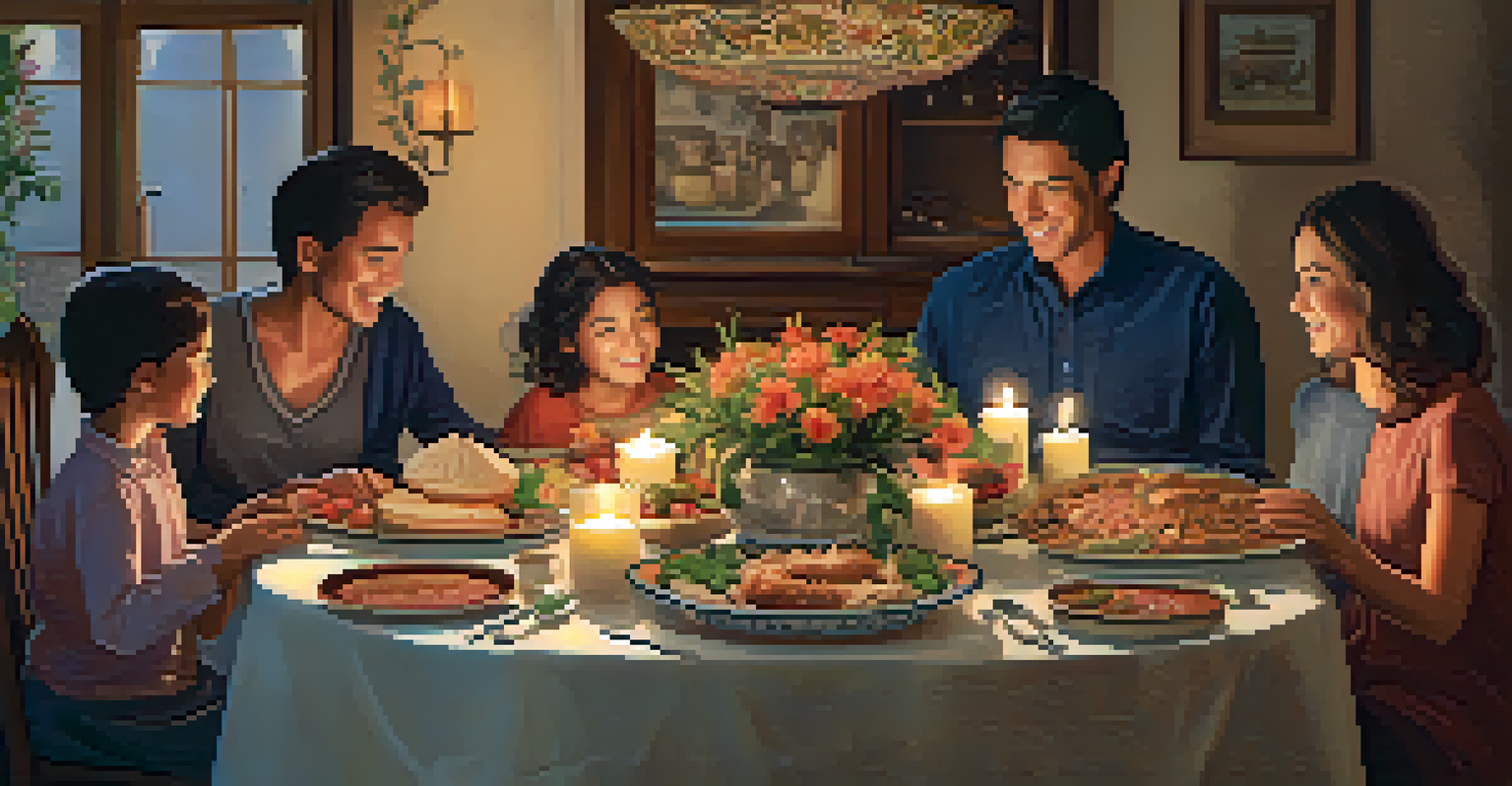The Role of Rituals in Defining Personal Identity and Spirituality

What Are Rituals and Their Importance in Our Lives?
Rituals are structured actions or ceremonies that hold personal or cultural significance. They can range from daily habits, like morning coffee, to significant life events, such as weddings or funerals. These practices often provide a sense of continuity and connection to our past, helping us navigate life's changes.
Rituals are the formulas by which harmony is restored.
In many cultures, rituals mark important transitions, offering a framework for understanding the world around us. They can ground us in our identity, reminding us of who we are and where we come from. This grounding effect can be especially comforting during times of uncertainty.
Moreover, rituals serve as a bridge between the individual and the collective, fostering a sense of belonging. Whether it's a family tradition or a community celebration, these shared experiences reinforce our connections and help us feel part of something larger than ourselves.
Rituals as a Reflection of Personal Identity
Our personal identities are often shaped by the rituals we engage in. For example, a person who practices yoga regularly may find that this ritual influences their outlook on life, promoting mindfulness and self-awareness. In this way, rituals can be powerful tools for self-definition.

As we adopt certain rituals, we also communicate our values and beliefs to the world. Whether it's celebrating specific holidays or participating in cultural practices, these actions signal who we are and what we stand for. They become a part of our narrative, weaving into the fabric of our identity.
Rituals Shape Our Identity
Engaging in rituals reflects our personal values and beliefs, helping to define who we are.
Additionally, rituals can evolve over time, reflecting changes in our personal journey. A ritual that once provided comfort during a difficult time may transform into something celebratory as we grow. This adaptability underscores the dynamic nature of our identities.
Spirituality and the Role of Rituals
Rituals are deeply intertwined with spirituality, often serving as pathways to explore and express our spiritual beliefs. Many people find that engaging in rituals—whether religious or personal—helps them connect with something greater than themselves. This connection can foster a profound sense of peace and purpose.
Ritual is the way we make sense of our lives, the way we create order out of chaos.
For instance, lighting candles during meditation or prayer can create an atmosphere conducive to spiritual reflection. These actions often deepen our experiences, allowing us to tap into our inner selves and the universe around us. It's as if these rituals create a sacred space where we can explore our spirituality unhindered.
Moreover, rituals can provide a sense of community among those who share similar beliefs. By participating in collective rituals, individuals often experience a shared spiritual journey, reinforcing their connection to both the divine and each other.
Cultural Variations in Ritual Practices
Rituals vary significantly across cultures, each carrying unique meanings and significance. For example, in many Indigenous cultures, rituals related to nature and seasons are common, reflecting a deep respect for the environment. These practices often emphasize harmony and balance, shaping the community's identity.
In contrast, Western cultures may focus on individual achievement, with rituals centered around personal milestones like graduations or job promotions. While these practices highlight personal success, they can also lead to a sense of isolation if not paired with community connections.
Rituals Foster Community Connections
Shared rituals create a sense of belonging, reinforcing bonds and connections within communities.
Understanding these cultural variations enriches our perspective on identity and spirituality. It allows us to appreciate the diverse ways people seek meaning in their lives and how rituals play a crucial role in shaping those experiences.
Rituals During Life Transitions
Life transitions, such as birth, marriage, and death, often prompt individuals to engage in rituals that help them navigate these changes. These ceremonies provide structure and meaning during times that can feel chaotic or overwhelming. For example, a wedding ritual not only celebrates a union but also marks the beginning of a new chapter.
Additionally, rituals associated with grief, like memorial services, can help individuals process their emotions and find closure. These practices offer a communal space for sharing memories and honoring loved ones, fostering healing and support.
Rituals can also serve as a way to set intentions for the future. Whether it's a New Year's resolution or a personal goal-setting ceremony, these actions can empower individuals to embrace change and move forward with purpose.
Creating Personal Rituals for Self-Discovery
While many rituals are inherited from cultural or familial traditions, creating personal rituals can be a powerful tool for self-discovery. These rituals can be tailored to reflect our unique values and aspirations, helping us carve out our own paths. For instance, someone might establish a weekly gratitude ritual to cultivate positivity in their life.
Personal rituals can also serve as anchors during busy or stressful times. Taking a few moments for a morning meditation or evening reflection can ground us and provide clarity. These practices remind us to slow down and reconnect with ourselves amidst the noise of everyday life.
Rituals Enhance Mental Well-Being
Participating in rituals can provide structure and comfort, promoting mindfulness and reducing feelings of isolation.
Ultimately, the beauty of personal rituals lies in their flexibility. They can evolve as we grow, adapting to our changing needs and circumstances while continuing to reflect our journey.
The Impact of Rituals on Mental Well-Being
Engaging in rituals has been shown to have a positive impact on mental well-being. The predictability and structure of rituals can provide comfort, especially in times of stress or anxiety. For many, these familiar practices create a sense of stability and control in an unpredictable world.
Additionally, rituals can promote mindfulness and presence. By focusing on the task at hand—whether it's preparing a meal or participating in a religious service—we can cultivate a deeper awareness of our thoughts and feelings. This mindfulness can lead to reduced stress and improved emotional health.

Moreover, rituals often foster social connections, which are crucial for mental well-being. Participating in group rituals can strengthen bonds with others, reducing feelings of isolation and enhancing our sense of belonging.